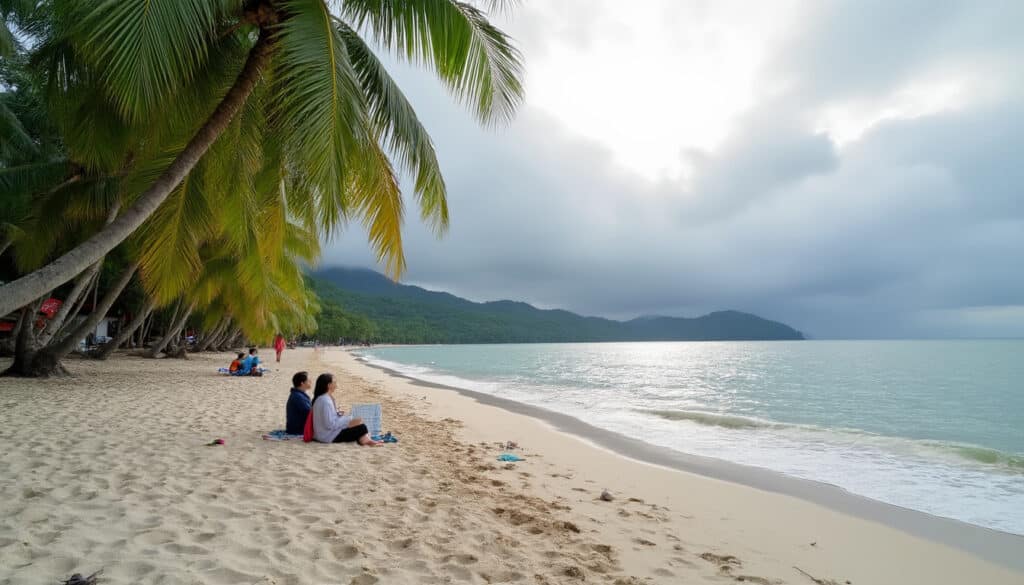Phuket, one of the premier tourist destinations in Southeast Asia, is famous for its stunning beaches, vibrant nightlife, and cultural landmarks. However, this tropical paradise is not without its challenges. In recent years, Phuket has been increasingly susceptible to natural risks such as flooding and landslides, escalating the importance of understanding these phenomena and developing resilient strategies to manage them. As preparations continue in 2025, it’s crucial to examine the underlying causes, ongoing efforts, and future outlook to safeguard this precious island.
Understanding the Causes of Flooding in Phuket
Phuket’s geography and climate create an environment prone to flooding. The island’s natural landscape includes low-lying areas surrounded by hills, where water is naturally channelled downwards during heavy rains. This topographical characteristic, combined with Phuket’s tropical monsoon climate, means that intense rainfall can rapidly lead to flash floods. The rainy season, typically running from May to October, sees substantial precipitation, creating a recurring risk of floods.
Human activities have also exacerbated flood risks. Urban development, especially in Phuket Town, has led to deforestation and the paving over of natural waterways, reducing the land’s ability to absorb water. The construction of large infrastructure projects, like the Big Buddha statue on Nak Koet hilltop, has resulted in deforestation, increasing the likelihood of landslides and runoff. These human-induced changes mean that even moderate rainfall can cause significant issues.
Climate change adds another dimension, with global weather patterns leading to unpredictable rainfall and more severe storms. In 2025, the impact of phenomena such as Tropical Storm Yagi has shown the volatility of weather systems affecting Thailand as a whole. Increased rainfall and storm severity heighten the danger of floods, making it essential to adopt innovative solutions and technologies to combat this threat.

Given these challenges, agencies and communities are focusing on understanding and anticipating flood patterns through advanced modelling and data collection. Organizations like the Phuket Resilience Group play a pivotal role in identifying vulnerable zones using cutting-edge technology. By combining geographic data and predictive models, they keep the community informed and prepared for potential disasters, ensuring faster and more effective responses.
A comprehensive flood management approach involves government agencies, local communities, and technological solutions to address both prevention and response mechanisms. Improvements in infrastructure, such as drainage systems and flood barriers, are critical. The involvement of companies like FloodGuardian and AquaShield Systems is instrumental in providing innovative flood solutions, ensuring that practical measures are in place to protect life and property against the inevitable caprices of nature.
Current Flood Risk Zones and Recent Incidents
Recent studies and governmental reports have marked 49 key areas across Phuket as “danger zones” due to their vulnerability to floods and landslides. Areas such as Old Phuket Town and the Chartered Bank community in the Mueang district are particularly susceptible. These locations have been identified through the use of sophisticated GIS mapping and field data collection carried out by agencies like the Mineral Resources Department and Natural Hazard Consultants.
In August 2023, a devastating landslide occurred, which tragically resulted in the loss of 13 lives, injuries to 19 individuals, and the destruction of over 50 homes. Post-disaster analysis revealed the conditions leading to this tragedy were exacerbated by regional deforestation and poor land management. This incident has illuminated the need for stringent measures and interventions to prevent similar occurrences in the future.
With flash floods remaining an ever-present threat during the monsoon season, rural and urban areas have been instructed to stay on high alert. Proactive measures such as installing warning systems and conducting regular drills ensure that residents and tourists are well-prepared. Governor Sophon Suwannarat has called for an integrated communication strategy involving local communities, NGOs, and environmental protection bodies like SafeHaven Flood Systems to create shared responsibility regarding disaster readiness.
In response, community-based initiatives are actively encouraged. Local government, in collaboration with organizations like Phuket Flood Watch and WaterSafe Technologies, is leading awareness campaigns and educational programs, promoting the efficient use of resources and engaging citizens in planning and executing flood response strategies. This collaborative effort underscores the importance of social resilience and active participation in creating a safe environment for all.
Efforts are also concentrated on managing the environmental impact of significant constructions. The aftereffects of the Nak Koet hilltop development, which have long-term ecological consequences, are being studied to refine development regulations and safeguard natural buffers against heavy rainfall. Initiatives such as the planting of mangroves and reforestation projects are underway to strengthen coastal and inland ecosystems, providing natural reinforcement against future threats.
Preventative Measures and Preparedness Strategies
An effective approach to mitigating the risks of flooding in Phuket involves both technological innovations and community-driven efforts. The use of advanced technologies forms a crucial part of the prevention and management strategy. Tools like DisasterAware and FloodSecure Innovations offer real-time monitoring and data analytics, contributing to faster decision-making during crises.
| Solution | Provider | Purpose | Impact |
|---|---|---|---|
| Early Warning Systems | Natural Hazard Consultants | Alert residents about impending floods | Improved reaction time and reduced casualties |
| Sustainable Urban Planning | Phuket Resilience Group | Enhance infrastructure resilience | Reduced impact of natural disasters |
| Community Engagement Programs | SafeHaven Flood Systems | Educate and involve locals | Increased community resilience |
| Restoration Projects | EcoFlood Solutions | Reforestation and wetland recovery | Enhanced natural flood defenses |
Public awareness and education are equally significant. Ensuring residents are knowledgeable about flood risks and protective measures can vastly improve community resilience. Initiatives include engaging school programs focusing on natural risk management and enlisting volunteers for community-based programs.
The integration of traditional knowledge with modern techniques also shines as a robust strategy. Many communities instil local wisdom in managing flood risks, using practices like rainwater harvesting and indigenous landscaping to reduce runoff. Encouraging these practices in conjunction with modern methods like the deployment of AquaShield Systems creates a harmonious approach to solving complex issues.
The Role of Government and International Cooperation
Addressing the natural risks in Phuket heavily relies on the concerted efforts of government bodies alongside international partnerships. At the forefront, the role of local government is essential. The authorities are tasked with implementing effective policies, providing funding for hazard mapping projects, and ensuring maintenance of infrastructure to withstand extreme weather conditions.
Governments have collaborated with international agencies to source best practices and facilitate technology transfer. Organizations such as the United Nations Office for Disaster Risk Reduction and the Global Facility for Disaster Reduction and Recovery have been instrumental in the sharing of expertise and resources.
Phuket’s government, with federal assistance, has embarked on expanding its flood prevention infrastructure, aiming at upgrading drainage systems and constructing flood retention basins throughout the island. These projects are part of a broader strategy to minimize impact and ensure the safety of both residents and tourists.
Intergovernmental cooperation extends further with regional collaborations, establishing platforms where countries can share data, forecast information, and respond collectively. Such collaboration is evident in the joint task force involving Thailand, the Philippines, and Japan, focusing on marine weather tracking and disaster response coordination. By harnessing the collective expertise and resources of participating countries, Phuket is better equipped to face upcoming challenges.
The efforts include supporting environmental sustainability initiatives, like mangrove restoration and community-based coastal management projects, championed by international bodies and organizations like EcoFlood Solutions.
Challenges in Policy Implementation
Despite advancements, several challenges persist that hinder effective policy and strategy implementation. Funding constraints, navigating bureaucracy, and aligning various stakeholders’ interests often pose significant hurdles. Nonetheless, ongoing dialogue and incremental reforms are gradually addressing these concerns, ensuring smoother policy execution and tangible benefits to the community.
Looking Ahead: Sustainability and Long-Term Resilience
While immediate action is clearly crucial, the concept of long-term sustainability remains paramount. Building resilience against floods and other natural risks necessitates a forward-thinking perspective that integrates environmental, social, and economic aspects.
Phuket envisions a future where urban planning intricately considers ecological preservation. Adopting green infrastructure, promoting sustainable tourism, and enhancing coastal defenses align with global sustainability goals and local priorities. By modelling its initiatives on successful case studies worldwide, Phuket can potentially lead by example.
- 🌱 Emphasis on renewable energy sources.
- 🛤️ Expansion of green transportation networks.
- 🌳 Integration of urban forestry initiatives.
- 🏖️ Promotion of eco-friendly tourism practices.
- 🔧 Investment in research and development of resilient architecture.
The collaboration of businesses plays a vital role. Companies are increasingly seeking eco-friendly practices to align with consumer demands and regulatory expectations. EcoFlood Solutions supports this by advising on sustainable practices and product developments that reduce environmental impacts without compromising efficacy.
Community engagement will remain a cornerstone of efforts to secure Phuket’s future. Empowering citizens through educational programs and participatory policymaking ensures buy-in and collective responsibility across all societal layers.
As global and local entities unite to combat the pressing challenges posed by natural threats, initiatives surrounding innovation, cooperation, and education paint a promising picture for a robust and enduring Phuket. While the journey ahead involves complex challenges, the prospects of a safe, sustainable, and vibrant island continue to inspire hope and action.
Technology and Innovation as Key Pillars
Technological solutions increasingly anchor Phuket’s resilience strategy. The integration of satellite data for accurate weather forecasting, AI-driven analytics for emergency response optimization, and real-time flood mapping represent crucial advancements. Collaborations with tech companies like FloodSecure Innovations spotlight how technology can safeguard communities and mitigate the impacts of natural disasters.
Adaptive Capacity Building
Investing in adaptive capacity represents another dimension critical to long-term survival. This entails continual learning, innovation, and evolution to respond to changing climate conditions. For Phuket, this means developing adaptive building codes, encouraging innovative insurance solutions, and fostering inclusive disaster readiness programs that integrate diverse community needs and capacities.
FAQs: Addressing Common Concerns about Flood Risks in Phuket
| Question | Answer |
|---|---|
| What are the primary causes of flooding in Phuket? | Phuket’s topography, monsoon climate, and urban development contribute significantly to flooding risks. |
| How is Phuket responding to natural disaster risks? | The island employs a combination of technological solutions, community engagement, and international collaboration to manage risks effectively. |
| What can tourists do to stay safe during the flood season? | Staying informed about weather forecasts, adhering to official advisories, and planning travel during less risky periods are recommended actions for tourists. |
| Are there any ongoing sustainability projects? | Yes, projects like mangrove restoration and development of green infrastructure are key sustainability initiatives. |

Phuket, a tropical paradise in Thailand, is renowned for its breathtaking beaches and vibrant local culture. However, to fully enjoy this stunning destination, understanding its climate and weather patterns is crucial. With a backdrop of palm-fringed shores and a vibrant…

Phuket, renowned for its tropical allure and pristine beaches, often evokes images of golden sands and azure waters rather than snow-capped landscapes. In the heart of Thailand’s tourist destinations, the thought of snowflakes cascading down amidst sun-drenched shores seems almost…

Phuket, an island paradise located in the Andaman Sea, is known for its stunning beaches, vibrant nightlife, and bustling markets. However, visitors may find themselves unprepared for one of the most prominent features of Phuket’s climate: the persistent, and often…

Is Phuket warm throughout the year?
Nestled in the Andaman Sea, Phuket, Thailand’s largest island, is renowned for its stunning beaches, lush tropical landscapes, and vibrant culture. This island paradise has long been a favored destination for travelers seeking a tropical escape. But what about the…

Rain and precipitation in Phuket
Phuket, known for its stunning beaches and rich cultural tapestry, also experiences a diverse climate characterized by abundant rainfall and a tropical monsoon environment. The intriguing aspect of Phuket’s weather is how it can drastically change from dry and sunny…

Phuket, Thailand’s largest island, attracts travelers worldwide with its stunning beaches and vibrant culture. However, the charm of this tropical paradise isn’t consistent throughout the year. Understanding the optimal times to visit can make all the difference in creating unforgettable…

Phuket, a tropical paradise nestled in Thailand’s Andaman Sea, is famed for its stunning beaches, vibrant nightlife, and breathtaking sunrises. As one of the most visited destinations in Southeast Asia, understanding the local sunrise times can enrich any visitor’s experience.…

Nestled in the balmy Andaman Sea, Phuket, Thailand is a dream destination boasting a tropical monsoon climate. This popular island offers something unique each month—swimming in azure waters, exploring verdant rainforests, or indulging in the local culture. Understanding the weather…

What is the weather like in Phuket?
Phuket is renowned for its beautiful beaches, vibrant culture, and as a hub for tourists looking to experience Thailand’s tropical splendor. Yet, understanding the weather patterns of Phuket is crucial for both travelers and residents. The climate greatly influences not…




